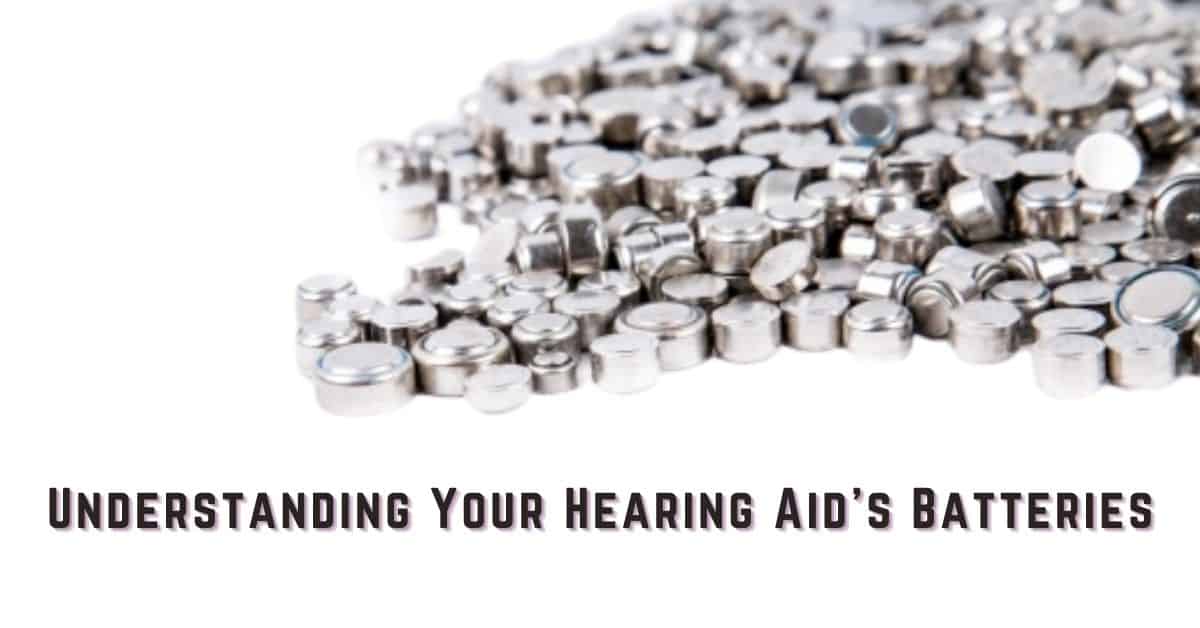Whether you’re buying your first hearing aids, or you’re ready to upgrade to a new pair of hearing devices, there’s a lot to learn about batteries. Hearing aid batteries provide power for your devices, so understanding your hearing aid’s batteries will help you find the best hearing aids for your listening needs.
Types of Hearing Aid Batteries
There are two main types of hearing aid batteries: disposable and rechargeable. Disposable batteries need to be changed every three to fourteen days to keep your hearing aids powered. Rechargeable batteries need to be recharged every night, but you’ll never need to change a hearing aid battery again!
Disposable Hearing Aid Batteries
Disposable hearing aid batteries are also called button batteries because of their small, flat shape. These zinc-air batteries are activated by air. When you remove the sealed sticker from the battery and it comes into contact with the air, it is automatically activated. As long as the seal is on the batteries, they are inactive, and you can store them for up to three years. Replacing the sticker on the batteries won’t deactivate the batteries, and the power will slowly drain from the batteries even if they’re not in your hearing aids.
Disposable hearing aid batteries come in several sizes, but they’re all smaller than a dime. They’re color coded to make it easier to remember the size you need for your hearing aids. All you’ll need to do is look for the color of your hearing aid batteries, and choose the brown, yellow, orange, or blue stickers. Larger hearing aids need bigger batteries, and provide more power for your hearing aid programs.
The best place to store your extra hearing aid batteries is in a dry, room temperature environment. This could be in your dresser drawer or in your closet. Keeping disposable hearing aid batteries in the fridge doesn’t prolong their shelf life. In fact, this humid environment could cause condensation to form under the sticker, and could activate the battery before you’re ready to use it.
Rechargeable Hearing Aid Batteries
Rechargeable hearing aid batteries are becoming more common. Rechargeable hearing aid batteries are very convenient, and you’ll never need to worry about running out of power in the middle of a busy day. Rechargeable batteries always stay in the hearing aids. All you’ll need to do is set the hearing aid onto the charger when you take them out at night. When you get up in the morning, they’ll be fully charged!
These lithium-ion batteries are available in a number of hearing aid styles, and they provide exceptional power. After one overnight charge, most rechargeable hearing aids have more than 20 hours of power. These rechargeable batteries will also last up to five years before they need to be replaced! Rechargeable hearing aid batteries can be much easier to handle. If you have any issues with dexterity or vision, changing the tiny disposable hearing aid batteries can be a struggle. Rechargeable batteries are simple to use, and you won’t waste any time trying to replace an old battery. Rechargeable hearing aid batteries are also safer around kids and pets. There are no small pieces that can be accidentally swallowed.
How to Get More Power From Your Hearing Aid Batteries
If you have disposable hearing aid batteries, there are a few ways you can extend the life of your batteries. Here are some of the best tips for getting more power for your hearing aid batteries:
- Turn off your hearing aids at night or whenever you’re not wearing them. This will conserve power.
- Open the battery door when you turn them off, and leave the battery door open overnight. Any moisture or condensation around the battery can dry overnight, extending your battery life.
- Store your hearing aids at room temperature, and don’t leave them in the bathroom or any other humid room in the house. Both humidity and heat can reduce your battery life.
Choosing Hearing Aids
When you’re choosing the perfect hearing aids, it’s best to base your decision on the hearing aid and how well you can hear, not on the features. Whether you find a device with disposable or rechargeable hearing aids, make sure you invest in a hearing aid that will give you the best in clear hearing. Contact us to learn more about the best hearing loss treatment for you!


